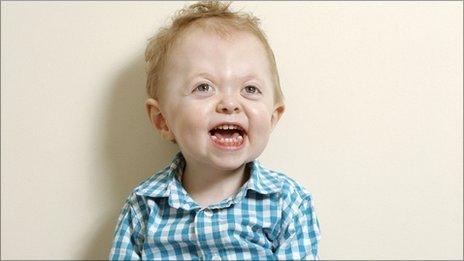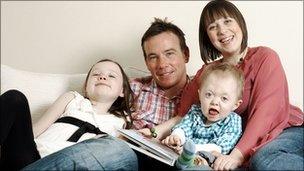A new skull for Finley
- Published

Finley has a rare genetic condition called Apert Syndrome
On one side of the gleaming operating theatre, one-year-old Finley lies anaesthetised and unconscious.
The whole of Finley's skull has been removed and his brain lies exposed, its pulse beating the seconds away.
Across the room, plastics and reconstructive surgeon David Johnson is cutting, sawing and breaking apart the pieces of Finley's skull before refashioning them to provide a completely new skull shape.
In 30 minutes' time, David will be finished and will place the new skull over Finley's brain and sew up the long zig-zag scar running from ear to ear over his scalp.
Upstairs at Oxford's John Radcliffe Hospital, Finley's parents wait and hope for news that the operation is over and that their baby boy is safe.
It has been a long 12 months for Diane and Lee Amey.
When Finley was born in Salisbury, Lee immediately noticed he was different. "His head was a funny shape with a horn a bit like a rhino, his hands were all joined together and his eyes were very bulgy."
The family were referred to the Oxford Craniofacial Unit where they learned that Finley had a rare genetic condition called Apert Syndrome.
Apert babies suffer lots of problems with their growth.
All of us have sutures in our skulls which allows the growing brain to push out the plates of the skull but in Apert babies, these sutures are all fused together. This is what was distorting the shape of Finley's skull and causing his eyes to bulge.
As the brain grows, pressure can build up inside the restricting skull. This can be dangerous, so the Oxford unit carries out a complex operation to remake the skull and give the brain space to grow.
It is an extraordinary operation to watch.
"It's like 3D carpentry really," says David Johnson. "Many of the techniques we use are the same except the raw materials we're working is bone."
After four or five hours of surgery, Finley's operation is complete and he is wheeled away to the recovery room to be reunited with his parents.
They see a baby who looks different after his surgery and who can, for the first time, close his eyes.
But, sadly, this is not the last operation he will face.
Holistic approach

Apert babies are born with their fingers and toes fused together so there will have to be operations to give him a functioning grip.
And, although the problems with his skull have now been addressed, his face will not grow in normal proportion, so he will have to have another operation in a few years' time to detach the bones of his face and slide them forward over a period of months on a metal frame.
The Oxford Unit has well over 1,000 children on their books. Every week they see 21 patients and perform three major head operations.
Only 20% of the patients have the type of genetic syndromes which will need repeated operations.
The vast majority of the children have one suture fused - usually caused by mechanical pressure in the womb. Their problems can be addressed by a one-off operation to remodel their skulls.
Oxford is one of only four centres in the country licensed to carry out the complex surgery needed by children like Finley.
The unit is led by two plastic surgeons and includes neurosurgeons, psychologists, speech therapists, orthoptists (eye specialists), and play therapists to make sure children do not fall too far behind during their lengthy hospital stays.
It also has specialist nurses and geneticists to research conditions and advise parents.
And it was actually the team's senior geneticist, Professor Andrew Wilkie, who identified for the first time the exact location of the tiny genetic "spelling mistake" which causes Apert Syndrome.
The team's psychologists counsel parents on how to deal with the stress of surgery but they also advise them on how to cope with having a child who often looks very different.
"The hardest thing has been people staring at him," says Lee. "I found that very difficult at first. But now, I encourage people to come up and ask a question so we can explain what's happened.
"Finley's no different from anyone else really... he just looks different."
The series Children's Craniofacial Surgery is produced for the BBC by Landmark Films.
It is broadcast on BBC Two on Wednesday at 2100 BST from 4 May. Or catch-up afterwards via BBC iPlayer at the above link.